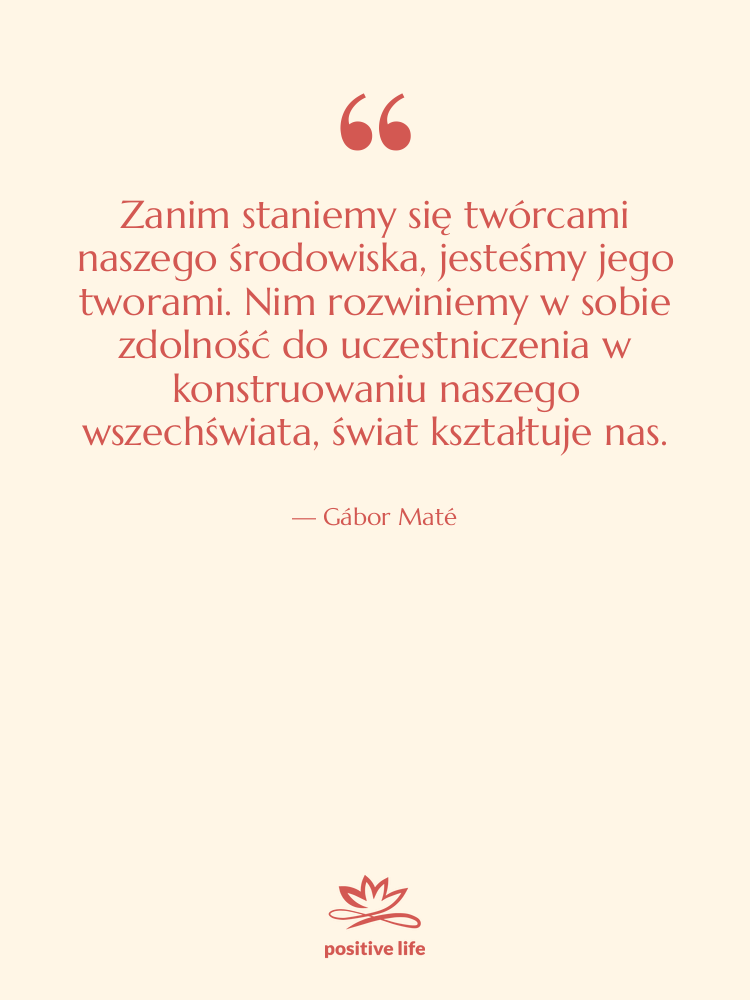
Zanim staniemy się twórcami naszego środowiska, jesteśmy jego tworami. Nim rozwiniemy w sobie zdolność do uczestniczenia w konstruowaniu naszego wszechświata, świat kształtuje nas.
Jesteśmy kształtowani przez środowisko, zanim zyskamy świadomą zdolność do jego twórczego zmieniania i samookreślenia.
The Dialectic of Shaping and Being Shaped
Gábor Maté's powerful statement
"Zanim staniemy się twórcami naszego środowiska, jesteśmy jego tworami. Nim rozwiniemy w sobie zdolność do uczestniczenia w konstruowaniu naszego wszechświata, świat kształtuje nas."
delves into the fundamental psychological and philosophical interplay between determinism and agency. It underscores a crucial developmental truth: that our initial state is one of profound receptivity and vulnerability to external influences, before we acquire the capacity to actively shape our reality.
At its core, this quote speaks to the profound impact of our early experiences – particularly childhood – on the formation of our psyche. Before we develop robust self-awareness, critical thinking, and the ability to intentionally choose our responses, our environment, through its myriad sensory inputs, emotional atmospheres, and relational dynamics, quite literally 'sculpts' us. This shaping occurs at multiple levels: neurobiological (brain development influenced by stimulation or trauma), emotional (attachment styles, emotional regulation capacities), cognitive (schemas, beliefs about self and world), and behavioral (patterns of response, coping mechanisms).
Maté, a renowned trauma expert, implicitly points to the way early adversities – chronic stress, neglect, abuse – can profoundly imprint themselves on our being, often outside of our conscious awareness. These imprints become foundational, influencing our subsequent interpretations of the world, our relationships, and our sense of self-worth. In this initial phase, we are less 'choosers' and more 'receivers', internalizing the messages, both explicit and implicit, conveyed by our primary caregivers and broader social contexts. The 'world' in this sense is not an abstract concept, but the concrete manifestation of our early relational and environmental landscapes.
The transition from being merely a 'creation' to becoming a 'creator' signifies psychological maturation and the development of agency. This involves a journey of self-discovery, often through introspection, therapy, or significant life experiences, where we begin to identify and challenge the internalized narratives and patterns that were formed in our more receptive, less conscious phase. It is about understanding how past experiences have shaped our present, not to absolve responsibility, but to gain the necessary insight to consciously choose a different path. This ability to 'construct our universe' implies self-authorship – the power to define our values, set our boundaries, choose our responses, and actively participate in creating a life that aligns with our authentic self, rather than being solely dictated by historical imprints. It is a process of reclaiming power that was initially held by external forces, transforming passive reception into active creation. Ultimately, Maté's words encapsulate the profound journey from unconscious being to conscious becoming.